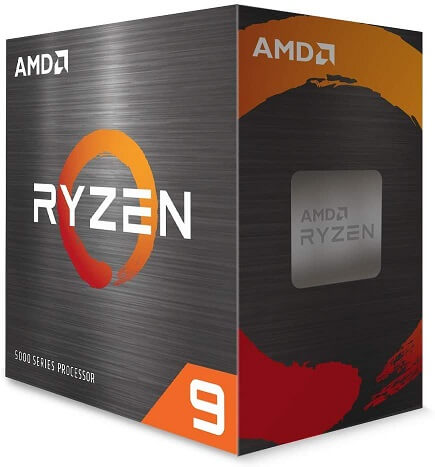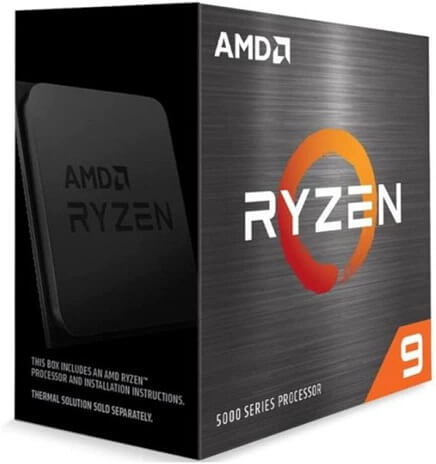The world of PC components can be overwhelming, especially with processors. For top performance, AMD’s Ryzen 5000 series offers two powerhouses: the Ryzen 5900X and 5950X. Both use the powerful Zen 3 architecture but serve different needs. This guide highlights the key differences between these processors, helping you choose the best one to maximize your PC’s potential.
Outline
ToggleAbout AMD Ryzen 5900X
 The Ryzen 5900X was introduced in early October 2020. It is the king of all 12 core processors with its blazing fast speed and ability to process 24 threads simultaneously. It has a base clock speed of 3.7GHz that can be bumped up to 4.8GHz while using turbo mode. Of course, the clock speed is only limited to 4.5GHz when utilizing all the cores but that is still pretty impressive.
The Ryzen 5900X was introduced in early October 2020. It is the king of all 12 core processors with its blazing fast speed and ability to process 24 threads simultaneously. It has a base clock speed of 3.7GHz that can be bumped up to 4.8GHz while using turbo mode. Of course, the clock speed is only limited to 4.5GHz when utilizing all the cores but that is still pretty impressive.
AMD has successfully reached very high single cores speeds and the Ryzen 5900X is a testament to this. As far as single-core speed is concerned, the Ryzen 5900X can beat even Intel processors including the i9 10th Generation series.
The Core complex or CCX structure has been altered in the Ryzen 5900X. The CCX is now an octa-core unit and each core has access to the 32MB L3 cache. The 5900X beats the 3900X in all aspects.
Pros and Cons
Pros
- Octa-core CCX structure provides a significant improvement over previous generations
- Clock speeds using all cores in turbo mode do not go down significantly as compared to single-core speeds
- Improved IPC leads to a much better gaming experience than earlier generations
- The 5900X will allow you to stream and play at the same time
- Much cheaper as compared to 5950X
Cons
- Not as good of a workstation as the 5950X due to the lower number of cores and thread count
- Multi-core performance is not as impressive as that of 5950X
About AMD Ryzen 5950X
 The Ryzen 5950X is a beast of a processor with 16 cores and a thread count of 32. It was also introduced along with the 5950X in early October 2020. It is rated for 105 Watts, just like the 5900X, and is the fastest 16-core processor available on the market. It has a base clock speed of 3.4GHz that can be ramped up to 4.9GHz by activating turbo mode. When utilizing all the cores, the maximum attainable clock speed is limited to 4.5GHz, just like in the 5950X.
The Ryzen 5950X is a beast of a processor with 16 cores and a thread count of 32. It was also introduced along with the 5950X in early October 2020. It is rated for 105 Watts, just like the 5900X, and is the fastest 16-core processor available on the market. It has a base clock speed of 3.4GHz that can be ramped up to 4.9GHz by activating turbo mode. When utilizing all the cores, the maximum attainable clock speed is limited to 4.5GHz, just like in the 5950X.
Although the 5950X is a higher-end processor than the 5900X, its single-core speed is not as impressive as the latter. However, having a lot more cores and threads allows it to be more versatile. It can double up as a workstation and a gaming rig.
The 5950X also features the new and improved CCX structure with an 8-core unit and all cores having access to the complete 32MB L3 cache memory. This processor is a significant improvement over its predecessors.
Pros and Cons
Pros
- This processor can run 32 threads simultaneously
- The fastest 16-core processor on the market
- Multi-core turbo mode does not affect the clock speed too much
- Incredible processor for workstation purposes
- It is very versatile as its gaming performance is also great
Cons
- Much more expensive than the 5900X
- Single-core performance is not as impressive as the 5900X which may lead to some games underperforming
5900x vs 5950x: Comparison Table
| 5900x | 5950x | |
| Cores | 12 | 16 |
| Single Core Clock Speed | 3.7GHz | 3.4GHz |
| Multi-core clock speed | 4.2GHz | 4.5GHz |
| CPU Threads | 24 | 32 |
| L2 cache | 6MB | 8MB |
| L1 cache | 768KB | 1024KB |
AMD Ryzen 5950X Vs 5900X: Gaming Performance
As far as only gaming is concerned, the 5950X may be beaten by the 5900X due to the latter’s superior single-core performance. This is quite evident while measuring performance with games like Far Cry New Dawn and Shadow of the Tomb Raider.
Having said that, there are a few games like Total War: Three Kingdoms, where the 5950X seems to outperform the 5900X. The 5950X does not properly utilize all of its 16 cores when it comes to gaming. This is evident as it gets a similar score as compared to the 12-core counterpart 5900X.
AMD Ryzen 5950X Vs 5900X: Rendering Performance
In terms of rendering, the 5950X, with its 16cores and 32 threads, will far outperform the 5900X as a multimedia rendering workstation. In applications that utilize all cores and require hyper-threading, the 5950X will prove to be a workhorse.
The 5950X outperforms the 5900X while rendering 1440p, 1080p in both medium and low settings. The 5950X can render 20% faster than the 5900X while using software like Blender.
AMD Ryzen 5950X Vs 5900X: Cooling
The 5950X has slightly less power consumption than the 5900X when running on a standard clock. However, when overclocked, the 5950X will consume significantly more power than the 5900X. Hence, if not overclocked, the 5950X will run cooler, and when overclocked the 5900X will be cooler.
It must be remembered that overclocking requires special cooling techniques. Using standard cooling may not be enough and can end up damaging the processor.
Conclusion:
The 5950X is superior to the 5900X in some ways. Having more cores and threads can lead to a much better multi-threaded performance. But, if your purposes are simply gaming, then the 5900X should be sufficient as it produces a similar performance when compared to the 5950X but at a much cheaper price. For multi-threaded applications, the 5950X will be a better choice.

